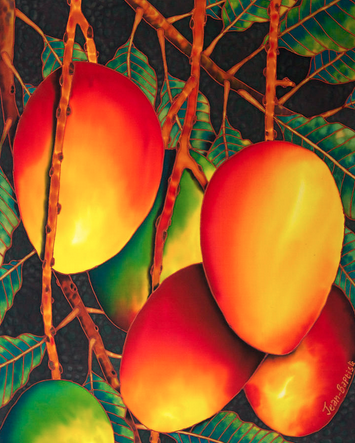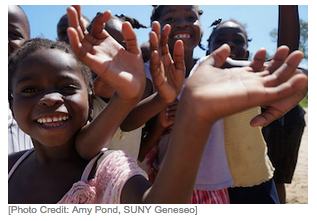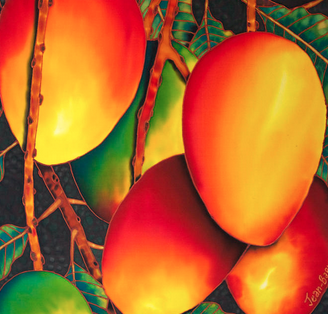As a team we were thrilled to see the number of outstanding responses to our call for entries in the HaitiHub writing contest. Because of the number of entries, we were only able to choose a few for publication. We’ve curated some of our favorites below.
The following two entries were selected based on their insight, and for their exemplification of our community’s commitment to see the way work is done in Haiti changed (for the better!)
Kathleen M. Nealon
“Mango Tree”

Painting by Daniel Jean-Baptiste
I step out of the door way, onto the cement path, and lock both doors. Just outside the orphanage’s play therapy room there is a mango tree. Sometimes I pass it without paying much attention to it. Sometimes I admire the flowers, leaves, or developing mangoes. On this evening, as questions float through my head, its very being speaks to me.
The mango tree providers shade, sheltering people who desire respite from the hot midday sun, always inviting, never coercing. There is no guarantee that anyone will eat its fruit, benefiting from the nourishment it is there to provide. Nor does the tree know if any of her seeds will ever be planted, take root, or bear fruit. It does not need to know. It allows the flowers to die, so the mangoes can come and in time releases the mangoes, keeping nothing for itself. The mango tree stands tall and firm, although like all living things it is vulnerable to the environment in which it finds itself, and can be hurt when branches are torn off prematurely by wind or playing children. The tree is aware of the other mango trees in the lakou, rooted in the same soil, entrusted with a shared mission though each is unique.
I walk by the house of the younger children and turn towards the convent, accepting that that I may never receive and do not need answers to my questions, certain only that since being transplanted, I have grown.
Steve Reeves
“Ayiti Cheri”
The smell of the pate wafts toward my nose, as I tear it apart and hand half to Louighens, my friend and brother emeritus. I eat silently, while between bites he conducts business on the phone that my stubborn ear can’t entirely discern. The crowd waits at Mais Gate, and watches the plane loads of people disembark from Miami, Atlanta, New York. Loved ones are greeted and tangible excitement resonates through the local populace with every reuniting. Some faces are new and bright, hopeful and eager to spread out from the airport to yet-unknown locales, like spokes of a wire wheel. Some faces betray underlying discomfort and uneasiness as they search for their person: The person from the NGO, the church, the ecclesiastical missions of renown in Haiti. I see the promise and anticipation in each eye, but I want to stop them – sit them down on the sidewalk and earn their rapt attention. Tell them to learn. Eat and enjoy. Respect. Walk with Dessalines and Christophe. Live the Citadel. Oh! To infect these newcomers with the love for my adopted country. Pound the pulpit and proselytize the strength of the Pearl of the Antilles. As the interior monologue begins to reach the height of its fervor, my thoughts are distracted by a sight at the gate – a particular face looking for their person, and I am he. I greet them enthusiastically, and a discerning compatriot would notice a devious gleam in my eye, and a slightly different stride. “Hello, zanmi mwen, welcome to my Ayiti Cheri.”
We’ve included this piece in our publication based on the unique circumstances in which the reader found himself, and for the nonplussed reaction of Joe and Jude as they navigate governmental bureaucracies – sometimes it just works out?
Joe Bradley
“Visa”
That day started like many others. I had plans, but they were to be set aside for a new agenda. We drove from Delmas 33 up toward Petionville and soon reached the pastor’s house to join some others for the day’s project.
I was talking with my friends when pastor Martinez drew me aside. He said, “There’s something important I need you to do today.” I was curious. He continued, “We need you to help Jude get his passport and visa to go to the US.”
But why me? I didn’t know a thing about Haitian passports and US Visas. He put $100 in my hand, “Just go with Jude. He will show you where.” This was typical Haitian, ‘I won’t explain; don’t ask, just do it; you’ find out.’ Jude was a medical student in his late 20’s whom I’d known since he was in high school, a good friend.
We arrived at the American Embassy downtown with no appointment. There was a huge crowd outside. I said to Jude, “We’ll never get in.” He nodded dejectedly. So we stood at the back and waited. After a few minutes an unknown man came up to us and said, “You need to go to the door.” “Eskize m’…eskize m’”, I said, feeling very embarrassed, as this ‘blan’ pressed to the front with Jude in tow. Any moment I was sure someone would hit me over the head, but no one said a word.
A lady came out, looking for the next person. I said, “We have important business. We need to see someone.” To our amazement she beckoned us in. We were given seats at the head of the line in the waiting room. I gave Jude the $100. He was terrified as to what he would say to the agent. In 10 minutes his turn came and he disappeared into an office. Not long afterwards he returned with a look of disbelief and a paper in his hand. The words stumbled out, “We spoke English; she said she was impressed; she joked with me.” We did the job, but we were not alone.
The following quotes have been excerpted from some other entries we really enjoyed.
“It wasn’t until I got home from Haiti that I could reflect and speak about it. Haiti impacted me like nothing else. It’s a place of contrasts – desperation and hope; poverty and contentment; crime, corruption, hunger, and disease – faith and peace.” – Martin W.
“My travels in Haiti have helped me to see people without so many layers of separation.” – Cheri L.
“Historically, the Christian Church has thought of “mission trips” as a time to teach about Jesus to people who have never heard of Him. Our guide through a museum of Haiti’s history told us, “Haiti has two things: faith and love.”…Our “mission” in Haiti is to come alongside our brothers and sisters, mutually encouraging one another!” – Sherry K.
Thank you to everyone for your wonderful submissions! We so appreciate you taking the time to share with us. Mèsi anpil!

